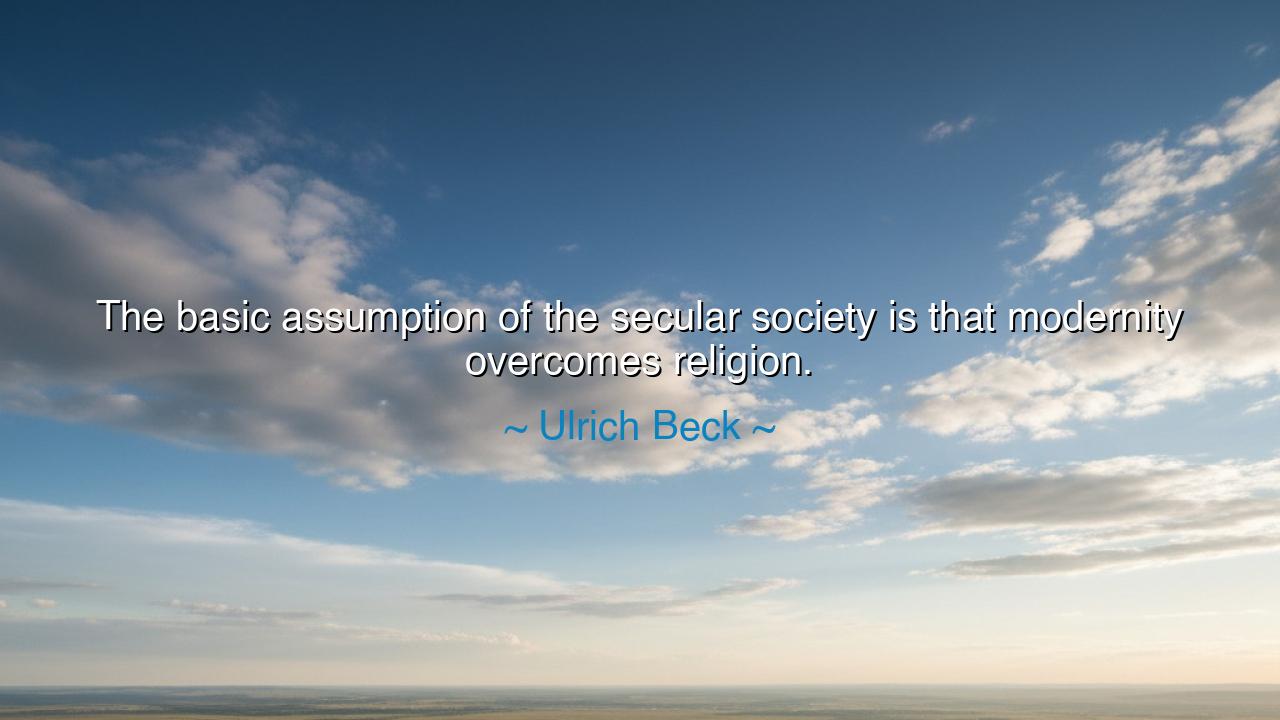
The basic assumption of the secular society is that modernity






Hear, O children of wisdom, the solemn words of Ulrich Beck: “The basic assumption of the secular society is that modernity overcomes religion.” In these words lies both a description of our age and a warning for the ages to come. For Beck, a prophet of sociology, saw that the rising towers of science, reason, and progress often claim to overshadow the temples of faith. The secular world assumes that with each invention, each discovery, each step forward into the realm of modernity, the ancient power of religion will fade into silence. But is this assumption truth, or illusion?
The origin of this thought lies in the long struggle between faith and reason, a struggle that stretches from the dawn of the Enlightenment. When Galileo pointed his telescope to the heavens, the Church resisted. When Darwin spoke of evolution, many trembled at the challenge. From those days until our own, many voices have declared that as knowledge increases, belief must decrease, and that modernity will triumph over the sacred. Beck, observing the world of the twentieth and twenty-first centuries, put this assumption into words—not to glorify it, but to question it.
History shows us the persistence of this tension. In Revolutionary France, men tore down the altars and crowned Reason as their goddess, believing that religion had been vanquished forever. Yet within a generation, churches reopened and faith returned, for the human heart does not live by reason alone. Likewise, in the Soviet Union, the state declared religion obsolete, silencing priests and demolishing shrines. Yet underground, in whispers and secret gatherings, faith endured until the empire itself fell. Thus, while modernity claims to overcome religion, time and again, religion rises from the ashes, proving that it cannot be erased so easily.
Beck’s words are not simply a chronicle of secular pride, but a call for reflection. For if society assumes that religion is overcome, then it ceases to engage with the sacred, dismissing it as relic rather than force. This breeds a dangerous blindness, for religion, whether embraced or rejected, continues to shape the hearts, the conflicts, and the destinies of nations. To ignore it is to misread the soul of humanity, to forget that beyond reason and progress lies the eternal hunger for meaning.
The meaning of the quote is thus layered: it reveals both the arrogance of modernity and the enduring resilience of faith. Technology may conquer disease, machines may shrink the earth, science may map the stars, but none of these answer the cry of the soul for purpose, for justice, for mercy. And so, while the secular world assumes victory, the sacred remains—sometimes diminished, sometimes reformed, sometimes hidden, but never extinguished.
The lesson for us is clear: do not believe that modernity alone can satisfy the human spirit. Science and progress are mighty gifts, but they cannot replace compassion, humility, and the yearning for transcendence. To live as though religion were unnecessary is to build a palace without foundations, a ship without anchor. Modernity may give us power, but without the wisdom of the sacred, power becomes peril.
Practical actions stand before you: embrace the gifts of modernity, but do not despise the wisdom of faith. Read not only the words of science, but also the scriptures of compassion. Engage in dialogue between reason and religion, for both are needed to guide humanity. And above all, remember that progress without morality is blind, while morality without progress is powerless. To hold them together is to walk wisely in the world.
Thus, remember the teaching of Ulrich Beck: “The basic assumption of the secular society is that modernity overcomes religion.” Let it be not a prophecy fulfilled, but a caution against forgetting the sacred roots of humanity. For if we allow modernity to silence religion completely, we risk losing not only faith in God, but also faith in one another. And without that, all the machines and knowledge of the world will not save us from ourselves.






AAdministratorAdministrator
Welcome, honored guests. Please leave a comment, we will respond soon